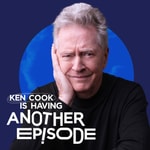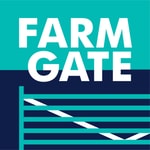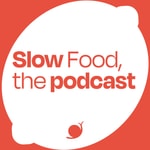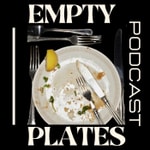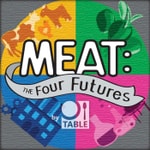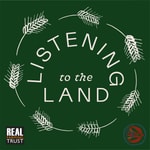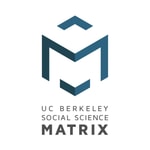Feed: a food systems podcast – Details, episodes & analysis
Podcast details
Technical and general information from the podcast's RSS feed.

Feed: a food systems podcast
TABLEdebates.org
Frequency: 1 episode/17d. Total Eps: 92

Is local or global more sustainable? What role should meat play in our diets? Who holds power in the food system? In a polarized world, this podcast explores the visions, values and evidence behind these debates. Feed, a project of TABLE, is in conversation with diverse experts who are trying to transform the food system.
Originally established as a collaboration between the University of Oxford, the Swedish University of Agricultural Sciences (SLU), and Wageningen University & Research (WUR), the TABLE network has since grown to include la Universidad de los Andes (Colombia) and la Universidad Nacional Autónoma de México. This podcast is operated by SLU.
For more info, visit https://tabledebates.org/podcast/
Recent rankings
Latest chart positions across Apple Podcasts and Spotify rankings.
Apple Podcasts
🇬🇧 Great Britain - food
23/07/2025#91🇬🇧 Great Britain - food
22/07/2025#50🇬🇧 Great Britain - food
21/07/2025#39🇬🇧 Great Britain - food
20/07/2025#83🇬🇧 Great Britain - food
19/07/2025#44🇬🇧 Great Britain - food
18/07/2025#28🇺🇸 USA - food
10/07/2025#99🇨🇦 Canada - food
03/07/2025#89🇨🇦 Canada - food
02/07/2025#76🇨🇦 Canada - food
01/07/2025#49
Spotify
No recent rankings available
Shared links between episodes and podcasts
Links found in episode descriptions and other podcasts that share them.
See all- https://tabledebates.org/meat
39 shares
- https://tabledebates.org/meat/quiz
36 shares
- https://twitter.com/agbioworld
2 shares
RSS feed quality and score
Technical evaluation of the podcast's RSS feed quality and structure.
See allScore global : 52%
Publication history
Monthly episode publishing history over the past years.
Valuing nature in our economies (w/ Adan Martinez Cruz)
Season 3 · Episode 10
jeudi 22 août 2024 • Duration 28:46
Environmental economist Adan L. Martinez-Cruz (Senior Lecturer at the Swedish University of Agricultural Sciences), argues that markets are a fundamental aspect of human society. He suggests that assigning a monetary value to natural resources can provide environmental benefits and create economic incentives to achieve them. In this episode, we discuss concept of non-market valuation, consider whether nature has inherent value, and examine whether markets are the best way to ensure fairness in the cost of food for both consumers and producers.
For more info, transcript and resources, visit: https://tabledebates.org/podcast/episode69
Guests
- Adan L. Martinez-Cruz, Environmental Economist at Swedish University of Agricultural Sciences
Episode edited and produced by Matthew Kessler and Ylva Carlqvist Warnborg. Music by Blue dot sessions.
There is no master metric for biodiversity (with Ville Lähde)
Season 3 · Episode 9
jeudi 15 août 2024 • Duration 40:23
Philosopher and environmental researcher Ville Lähde (with the Finnish BIOS Research Unit) argues that we need to understand biodiversity differently at a fundamental level in order to preserve it. Biodiversity loss is much more than the list of extinct and endangered species. In our conversation, we talk about the myriad food systems and their different relationships with biodiversity, what are the hidden costs of simplifying biodiversity, and why Ville feels closest to biodiversity when working with his compost pile.
Read the Life Matters Everywhere essay
For more info, transcript and resources, visit: https://tabledebates.org/podcast/episode68
Guests
- Ville Lähde, Philosopher and environmental researcher at BIOS
Episode edited and produced by Matthew Kessler and Ylva Carlqvist Warnborg. Music by Blue dot sessions.
What's a natural diet? (with Amy Styring)
Season 3 · Episode 5
jeudi 18 avril 2024 • Duration 25:37
Around 6000 years ago in Northwest Europe, our ancestors transitioned from hunter-gatherer societies to sedentary farming. How did their diets change during this time? The field of archaeological sciences and chemistry teamed up to shed new light on this question.
In this episode, we ask Amy Styring, archaeological chemist at the University of Oxford, what's her take on a natural diet, whether we overestimate the role of meat in our past diets, and what lessons can we learn today if we have a better understanding of how people produced and ate food in the past?
This is the first of a two-part series. Next week we hear from a meal historian on the role culture plays in informing what we eat.
For more info and resources, visit: https://tabledebates.org/podcast/episode59
Guests
- Amy Styring, Associate Professor at the University of Oxford
Episode edited and produced by Matthew Kessler. Music by Blue dot sessions.
Can we eat enough white-tailed deer to restore forest ecosystems?
Season 3 · Episode 4
jeudi 11 avril 2024 • Duration 31:08
Is it possible to eat enough white-tailed deer to keep their populations low enough to restore ecosystems? We posed this question to Bernd Blossey, professor at Cornell University who specializes in the management of invasive species and the restoration of disrupted ecological relationships.
In this episode, we look at the history of white-tailed deer in the eastern forests of the United States, how many we would need to harvest to keep the population in check, and whether the concept of ecosystem balance is scientific or a fantasy.
This is the third and final part of our series exploring whether we can eat our way out of the problems we’ve created. Let us know what you think by sending us an email or a voice memo to [email protected].
For more info and resources, visit: https://tabledebates.org/podcast/episode58
Guests
- Bernd Blossey, Professor at Cornell University
Episode edited and produced by Matthew Kessler. Music by Blue dot sessions.
Eating invasive crayfish - a solution to our ecological mess?
Season 3 · Episode 3
jeudi 4 avril 2024 • Duration 21:15
Are invasive species natural? If we introduced them, do we have some responsibility to manage them? What if we could reduce their numbers through the natural process of eating?
In this episode, Jackie Turner (TABLE) joins crayfish trapper Bob Ring to see if we can eat our way out of one of the environmental problems we’ve created - the spread of invasive American Signal Crayfish into the river Thames. We ask if these invasive crayfish are ‘natural’, how they ended up in London’s iconic river in the first place, whether they offer a promising sustainable food source, and why it is so difficult to earn a living doing what Bob Ring sees as an environmentally and ethically beneficial act.
This is the second of a three part series exploring if we can eat our way out of the problems we’ve caused. The last episode featured grasshoppers in Mexico and the next will be on white-tailed deer in forests of the eastern United States.
For more info and resources, visit: https://tabledebates.org/podcast/episode57
Guests
- Bob Ring, Crayfish Trapper in London
Episode edited and produced by Jackie Turner. Music by William King and Blue dot sessions.
Grasshoppers - agricultural pest or sustainable food?
Season 3 · Episode 2
jeudi 28 mars 2024 • Duration 25:06
What if we shifted our perspective from seeing some animal species as a problem to seeing them as an abundant and tasty source of food? Over the next few episodes, we’ll hear three "problems" in three regions: grasshoppers as pests in Mexico, invasive crayfish in London and overpopulated white-tailed deer in the United States.
With a rising trend for traditional foods, demand for grasshoppers has exploded in Mexico in the last decade--but is it sustainable? We ask sociologist-biologist Elena Lazos Chavero about the environmental, political, cultural, and health consequences of Mexico's appetite for grasshoppers.
For more info and resources, visit: https://tabledebates.org/podcast/episode56
Guests
- Elena Lazos Chavero, professor-researcher at the Universidad Nacional Autónoma de Mexico.
Episode edited and produced by Matthew Kessler. Music by Blue dot sessions.
Should food systems be more natural?
Season 3 · Episode 1
jeudi 21 mars 2024 • Duration 44:05
“Is a microbe less natural than a cow?”
This season we ask scientists, farmers, technologists and philosophers about how natural our food systems should be. In this age where industrial technology has profoundly transformed our eating habits and the landscapes around us, we explore whether we should let nature be our ultimate guide or fully lean into the technological innovations reshaping our world.
From the traditional milpa systems of Mexico to the cutting edge laboratories of food scientists, we bring together voices across the spectrum: an economist, an indigenous leader, a food technologist and an agroecologist. Each presents their perspective on the benefits—or drawbacks—of 'natural' food systems for both human health and the planet's well-being.
For more info and resources, visit: https://tabledebates.org/podcast/episode55
Guests
- Anna Lappé, Executive Director of the Global Alliance for the Future of Food
- Jayson Lusk, Dean and Vice President of Agriculture at Oklahoma State University
- Tania Eulalia Martinez Cruz, Director of the Food Sovereignty and Agroecology program at Land is Life
- Johan Jorgensen, Founder Partner at Sweden Food Tech
Episode edited and produced by Matthew Kessler. Music by Blue dot sessions.
Sofia Wilhelmsson on pig transport and human-animal relations (rebroadcast)
jeudi 29 février 2024 • Duration 31:52
Sofia Wilhelmsson researches a very specific and stressful time for farmed pigs: the loading and transport of pigs on their way to slaughter. She not only considers the welfare of the animals, but also the well-being of the pig transport drivers. In our conversation we chat about the relationships that humans have with animals; what food systems actors have the most power in the pig production system; and whether we can add incentives for animal welfare and human well-being in our food systems.
For more info, please visit: https://tabledebates.org/podcast/episode54
Interested in more podcasts about the future of meat and human-animal relations, Meat the four futures (Table, 2023)
Barbecue Earth (Carnegie Endowment for International Peace, 2024)
What is rewilding? (rebroadcast)
jeudi 15 février 2024 • Duration 30:26
Imagine a world where nature reclaims its place in the landscape. What would that mean for food systems? Walter Fraanje joins Feed co-hosts to talk about his new publication, "Rewilding and its implications for agriculture" co-authored with Tara Garnett.
The explainer introduces the concept of rewilding, compares different rewilding strategies across the globe, explores their relationship with agriculture and unpacks some of the related controversies. We ask Walter how does rewilding differ from conservation, why might a farmer or fisher support or be against rewilding, and what does it mean to rewild your imagination?
Read the full explainer
For more info, please visit:
Neena Prasad on the power of ultra-processed foods
Season 3
jeudi 18 janvier 2024 • Duration 41:32
People across the world are consuming more ultra-processed foods (UPFs). Will Latin American countries and elsewhere follow the path of the US and the UK, where over half of calories consumed now come from UPFs? Dr Neena Prasad, director of Bloomberg Philanthropies’ Food Policy Program, joins us to talk about the power of and the power behind UPFs. We talk about the utility and harms of processing foods, the links between the tobacco industry and UPFs, and the public health measures advocated by the Food Policy Program. These include taxing UPFs, putting restrictions on marketing (especially to children), advancing public sector health promoting policies, and front-of-package nutrition labeling.
For more info and transcript, visit: https://tabledebates.org/podcast/episode52
More info on Bloomberg Philanthropies' Food Policy Program
Read TABLE explainer on UPFs
Music by Blue dot sessions



